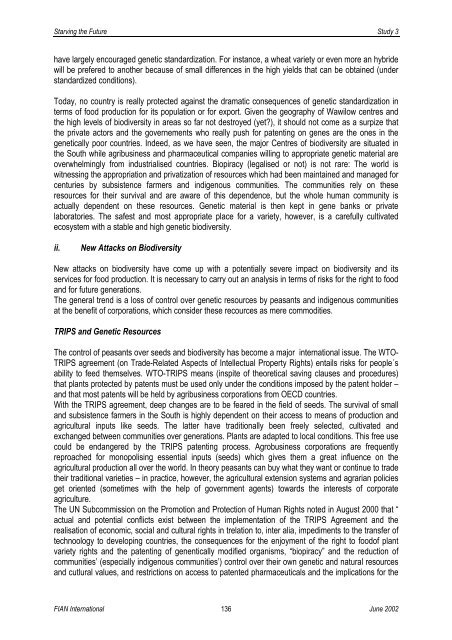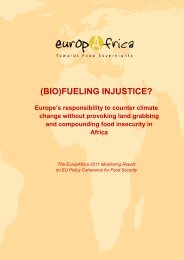Study 3: Ecodestruction and the Right to Food: The Cases of Water ...
Study 3: Ecodestruction and the Right to Food: The Cases of Water ...
Study 3: Ecodestruction and the Right to Food: The Cases of Water ...
You also want an ePaper? Increase the reach of your titles
YUMPU automatically turns print PDFs into web optimized ePapers that Google loves.
Starving <strong>the</strong> Future <strong>Study</strong> 3<br />
have largely encouraged genetic st<strong>and</strong>ardization. For instance, a wheat variety or even more an hybride<br />
will be prefered <strong>to</strong> ano<strong>the</strong>r because <strong>of</strong> small differences in <strong>the</strong> high yields that can be obtained (under<br />
st<strong>and</strong>ardized conditions).<br />
Today, no country is really protected against <strong>the</strong> dramatic consequences <strong>of</strong> genetic st<strong>and</strong>ardization in<br />
terms <strong>of</strong> food production for its population or for export. Given <strong>the</strong> geography <strong>of</strong> Wawilow centres <strong>and</strong><br />
<strong>the</strong> high levels <strong>of</strong> biodiversity in areas so far not destroyed (yet?), it should not come as a surpize that<br />
<strong>the</strong> private ac<strong>to</strong>rs <strong>and</strong> <strong>the</strong> governements who really push for patenting on genes are <strong>the</strong> ones in <strong>the</strong><br />
genetically poor countries. Indeed, as we have seen, <strong>the</strong> major Centres <strong>of</strong> biodiversity are situated in<br />
<strong>the</strong> South while agribusiness <strong>and</strong> pharmaceutical companies willing <strong>to</strong> appropriate genetic material are<br />
overwhelmingly from industrialised countries. Biopiracy (legalised or not) is not rare: <strong>The</strong> world is<br />
witnessing <strong>the</strong> appropriation <strong>and</strong> privatization <strong>of</strong> resources which had been maintained <strong>and</strong> managed for<br />
centuries by subsistence farmers <strong>and</strong> indigenous communities. <strong>The</strong> communities rely on <strong>the</strong>se<br />
resources for <strong>the</strong>ir survival <strong>and</strong> are aware <strong>of</strong> this dependence, but <strong>the</strong> whole human community is<br />
actually dependent on <strong>the</strong>se resources. Genetic material is <strong>the</strong>n kept in gene banks or private<br />
labora<strong>to</strong>ries. <strong>The</strong> safest <strong>and</strong> most appropriate place for a variety, however, is a carefully cultivated<br />
ecosystem with a stable <strong>and</strong> high genetic biodiversity.<br />
ii. New Attacks on Biodiversity<br />
New attacks on biodiversity have come up with a potentially severe impact on biodiversity <strong>and</strong> its<br />
services for food production. It is necessary <strong>to</strong> carry out an analysis in terms <strong>of</strong> risks for <strong>the</strong> right <strong>to</strong> food<br />
<strong>and</strong> for future generations.<br />
<strong>The</strong> general trend is a loss <strong>of</strong> control over genetic resources by peasants <strong>and</strong> indigenous communities<br />
at <strong>the</strong> benefit <strong>of</strong> corporations, which consider <strong>the</strong>se recources as mere commodities.<br />
TRIPS <strong>and</strong> Genetic Resources<br />
<strong>The</strong> control <strong>of</strong> peasants over seeds <strong>and</strong> biodiversity has become a major international issue. <strong>The</strong> WTO-<br />
TRIPS agreement (on Trade-Related Aspects <strong>of</strong> Intellectual Property <strong>Right</strong>s) entails risks for people´s<br />
ability <strong>to</strong> feed <strong>the</strong>mselves. WTO-TRIPS means (inspite <strong>of</strong> <strong>the</strong>oretical saving clauses <strong>and</strong> procedures)<br />
that plants protected by patents must be used only under <strong>the</strong> conditions imposed by <strong>the</strong> patent holder –<br />
<strong>and</strong> that most patents will be held by agribusiness corporations from OECD countries.<br />
With <strong>the</strong> TRIPS agreement, deep changes are <strong>to</strong> be feared in <strong>the</strong> field <strong>of</strong> seeds. <strong>The</strong> survival <strong>of</strong> small<br />
<strong>and</strong> subsistence farmers in <strong>the</strong> South is highly dependent on <strong>the</strong>ir access <strong>to</strong> means <strong>of</strong> production <strong>and</strong><br />
agricultural inputs like seeds. <strong>The</strong> latter have traditionally been freely selected, cultivated <strong>and</strong><br />
exchanged between communities over generations. Plants are adapted <strong>to</strong> local conditions. This free use<br />
could be endangered by <strong>the</strong> TRIPS patenting process. Agrobusiness corporations are frequently<br />
reproached for monopolising essential inputs (seeds) which gives <strong>the</strong>m a great influence on <strong>the</strong><br />
agricultural production all over <strong>the</strong> world. In <strong>the</strong>ory peasants can buy what <strong>the</strong>y want or continue <strong>to</strong> trade<br />
<strong>the</strong>ir traditional varieties – in practice, however, <strong>the</strong> agricultural extension systems <strong>and</strong> agrarian policies<br />
get oriented (sometimes with <strong>the</strong> help <strong>of</strong> government agents) <strong>to</strong>wards <strong>the</strong> interests <strong>of</strong> corporate<br />
agriculture.<br />
<strong>The</strong> UN Subcommission on <strong>the</strong> Promotion <strong>and</strong> Protection <strong>of</strong> Human <strong>Right</strong>s noted in August 2000 that “<br />
actual <strong>and</strong> potential conflicts exist between <strong>the</strong> implementation <strong>of</strong> <strong>the</strong> TRIPS Agreement <strong>and</strong> <strong>the</strong><br />
realisation <strong>of</strong> economic, social <strong>and</strong> cultural rights in trelation <strong>to</strong>, inter alia, impediments <strong>to</strong> <strong>the</strong> transfer <strong>of</strong><br />
technoology <strong>to</strong> developing countries, <strong>the</strong> consequences for <strong>the</strong> enjoyment <strong>of</strong> <strong>the</strong> right <strong>to</strong> food<strong>of</strong> plant<br />
variety rights <strong>and</strong> <strong>the</strong> patenting <strong>of</strong> genentically modified organisms, “biopiracy” <strong>and</strong> <strong>the</strong> reduction <strong>of</strong><br />
communities’ (especially indigenous communities’) control over <strong>the</strong>ir own genetic <strong>and</strong> natural resources<br />
<strong>and</strong> cutlural values, <strong>and</strong> restrictions on access <strong>to</strong> patented pharmaceuticals <strong>and</strong> <strong>the</strong> implications for <strong>the</strong><br />
FIAN International 136<br />
June 2002
















